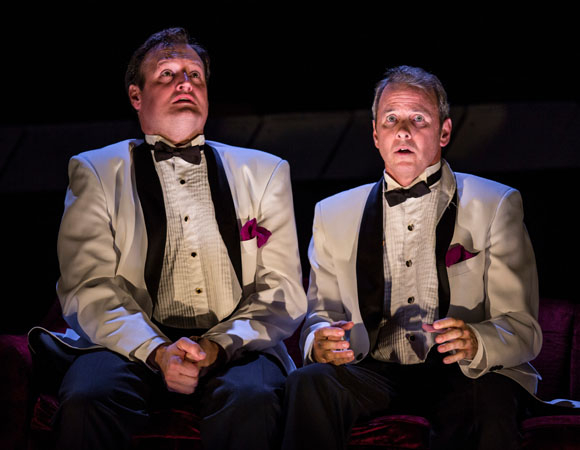Smokefall

(© Liz Lauren)
Midwestern-born Thornton Wilder, author of the iconic Our Town, had a twin brother who died at birth. You may ask what this has to do with the Goodman Theatre world premiere (in a co-production with South Coast Repertory) of Noah Haidle’s Smokefall. The answer is, plenty. Haidle acknowledges his homage to Wilder and Our Town, with both plays featuring an avuncular narrator, an intense examination of the nuclear family and scenes set in a limbo reality. Smokefall also has twin brothers as characters — who have a conversation in their mother’s womb — one of whom dies at birth. Haidle is a Midwesterner, as well, and Smokefall is set in Grand Rapids, Michigan, where Haidle was born and raised.
There are thematic parallels, too, as both Our Town and Smokefall address the bedrock truth that we are born into life only to experience loss and death, despite which humanity endures. Homage notwithstanding, do not mistake Smokefall for a mere gloss on Our Town. It’s a powerful original work with sustained humor, high intelligence, showmanship, and unexpected flashes of warmth. Haidle and Wilder may parse the same metaphysics, but Haidle goes beyond Wilder’s examination in considerably darker ways, among them several discussions of original sin (although Smokefall otherwise is not overtly Christian).
In Our Town, Wilder portrays love, marriage, and family as life-sustaining values. Haidle’s more existential stance declares that love, if it’s possible at all, is no more than a salve on a wound that cannot heal. Set mainly in the present and future, Smokefall (the title alludes to the time just before nightfall and also soot and ash from a smoke cloud) begins the day Daniel (Eric Slater) abandons his wife, Violet (Katherine Keberlein), about to give birth to twin boys, and adolescent daughter Beauty (Catherine Combs), a girl who stopped talking three years earlier and eats bark, earth, and paste. The exemplary long opening scene is immediately engaging as the family plays out domestic life — having breakfast, going to work or school — with amusing and touching naturalism, while the narrator interjects numbered explanatory footnotes that stamp the characters with desperation and sorrow. It’s a potent combination of tenderness and heartbreak that’s devastating.
Much of Smokefall reveals what led to the abandonment and what follows it, not as events but as emotional stages. The play ends up spanning four generations of a middle-class family, almost all of whom fail (sic, not “fall”) in love or find love unable to fill their spiritual void. Grandpa, a retired colonel (beloved Chicago actor and Broadway veteran Mike Nussbaum) sets the parameters of love and, in a sense, the show, declaring that "every love story is a tragedy because its ending is built into its beginning."
Haidle can’t sustain the tone and pitch of the brilliant opening over a two-hour running time, nor does he try. He’s not a playwright who pursues psychological realism too far. Instead, he follows the opening with a short vaudeville routine in which the Colonel visits his wife’s grave, and an extended verbal comedy act by tuxedoed twin brothers about to be born (Guy Massey, who becomes the narrator, and Slater). Act II takes place in a limbo in which all the characters except the dead twin make appearances (with Nussbaum playing the surviving twin as an old man and Massey playing his adult son).
Smokefall is a play of significant weight and size, shaped to a fare-thee-well by director Anne Kauffman and an expressive cast with both comedy chops and the ability to project dramatic subtext. Keberlein and Combs as mother and daughter are especially poignant in their brief exchanges, as when Beauty kisses her pregnant mom’s belly, but Slater is the most versatile, seamlessly shifting from the intellectual verbal comedy of the womb scene to a father about to abandon his family, to a young and sincere lover in a flashback. Scenic designer Kevin Depinet’s appropriately skewed house reflects a family that is emotionally akimbo. Each floor and the roof runs at angles across the stage and there are no walls dividing the rooms (bathroom, kitchen, stairway, living room), as if to convey “nowhere to hide.”
Haidel’s varied theatrical techniques — vaudeville routine, direct narration, magic realism — don’t necessarily mesh, but they serve their purpose, which is to distance viewers emotionally from the characters, or perhaps to distance Haidle himself as he addresses profound issues with compassion but without much hopefulness. Here again he parts ways with Wilder who believed that fleeting joys, often found in small things, give sufficient value to the cycle of life. For Haidle, however, transient joys aren’t enough but we have no other choice once life is forced upon us. Haidle rejects suicide, the only alternative, which he represents in the curious comic discourse (also a highly philosophical dialogue) between twin brothers in the womb.
Haidle’s playwriting star is on the rise and Smokefall shows why, wrapping its serious theme in a bright and theatrically diverting package.











